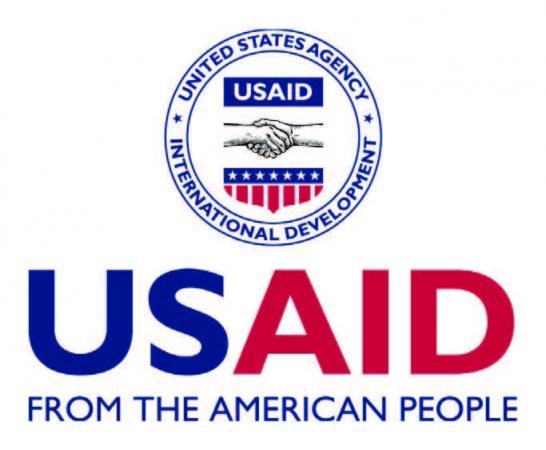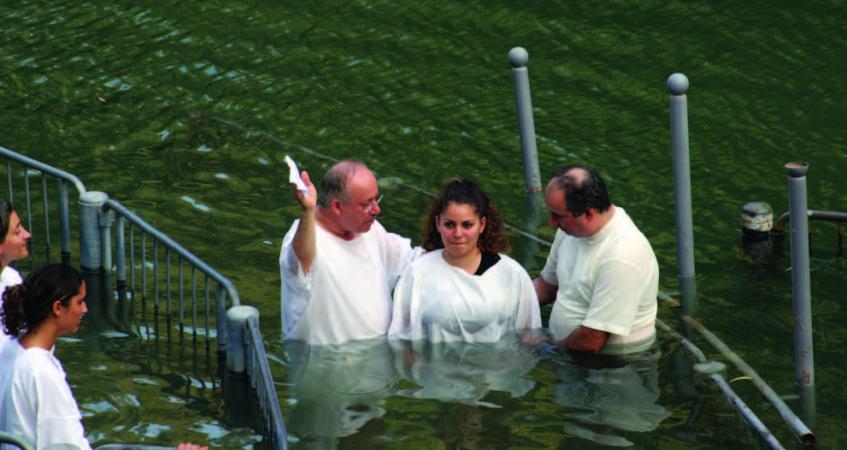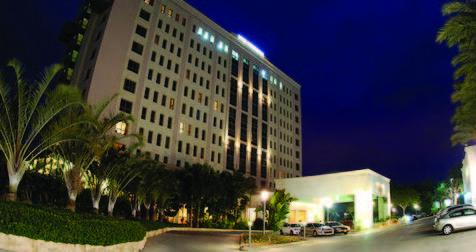Most Americans – even in government – remain blissfully unaware that U.S. funds have been used for some time now to promote an entity that is indistinguishable from a state.
By Buzzy Gordon
Not long ago, 13 North American journalists representing Catholic and Protestant Evangelist media outlets were hosted by “Palestine” — not the Palestinian Authority (PA) — on a familiarization trip to Christian holy sites primarily in the West Bank and Jerusalem. The entire $75,000 cost of the visit was borne by the United States Agency for International Development (USAID), for the purpose of introducing reporters to the local tourism industry, a hopeful sector of the PA’s emerging economy.
For the occasion, maps of “Palestine” were distributed to the journalists. The map, which specifically credit USAID for the funding, identifies Arab cities and towns inside Israel proper – but never mentions Israel, leaves out Tel Aviv (and virtually all Jewish cities) altogether, and drops the name Ben Gurion from the international airport.
Moreover, according to several journalists who participated, the trip was hijacked by a political agenda.
“During our bus rides, we were subjected to endless harangues of how bad the Jews are, and how Israel’s occupation is ruining the lives of the Palestinian people,” said Carol Smith, then editor of Group Tour Magazine. (Note: Smith is now copyeditor of Jewish.Travel.)
“It seemed more important to our guides to lecture us on Israeli evils than to familiarize us, for example, with opportunities to promote shopping at local enterprises, which would have contributed to increased prosperity for Palestinian businesses and entrepreneurs.” Smith, who was on her third trip to the region, had previously observed Palestinian cooperatives established to showcase such native crafts as embroidery. She recalled being impressed not only by the workmanship, but also the hope these cooperatives hold out for women both to gain more respect and earn much needed income for their families.
Yet she found it ironic that she had discovered these cooperatives while visiting Israel even in Jewish West Jerusalem while the Palestinians completely ignored this phenomenon. “Instead,” she said, “we were taken to pay homage at the tomb of Yasser Arafat hardly a spiritual (or even sightseeing) highlight for American Christians.”
She also recalled a half day in Hebron, where the main purpose of the visit was to portray how Jewish settlers constantly harass Arab shop owners. Meanwhile, participants learned nothing of the significance of the burial place of Abraham to Christians; they were told simply it was a mosque, with no hint of its co existence with a synagogue. The nearby historical site of Solomon’s Pools was not even on the itinerary.
Russell Jones, a television correspondent for the program Travel with Spirit, was also disturbed by the diatribes.
“While I appreciated the opportunity to learn about the concerns of the Palestinian people,” Jones said, “I was deeply troubled by the constant barrage of anti-Israel rhetoric.
“While I appreciated the opportunity to learn about the concerns of the Palestinian people,” Jones said, “I was deeply troubled by the constant barrage of anti-Israel rhetoric.
“Even more troubling was the discovery that U.S. taxpayer dollars funded a trip which promoted propaganda contrary to U.S. policy.”
According to Smith and Jones, the Palestinians’ major complaints were about the separation wall (which Israel calls its security fence) and the wanton destruction of Palestinian olive groves. “We heard repeatedly that the Israelis have uprooted hundreds of olive trees that had belonged to Palestinian families for generations,” Smith recalled.
Even worse, from the perspective of pilgrimage groups, was the Palestinian organizers’ virtual boycott of any Christian tourism or religious attractions that had any connection with Israel. When the tour bus drove by the Dead Sea Scroll site of Qumran, journalists were allowed only to view some caves from a distance; they were not able to see the excellent video demonstration that explains the link of the historical site to John the Baptist, because it is part of a visit to the center that is administered by Israel’s National Parks Authority.
While the trip could not avoid the Galilee (in Israel proper) because of the area’s importance in Christian history, participants were similarly denied the exploration of ancient Capernaum, a seat of Jesus’ ministry on the Sea of Galilee. The restoration of Capernaum is another project of the Israel Antiquities Authority, in conjunction with Israel’s national parks network.
Smith and Jones were perhaps most astounded that the most seminal experience for Christian pilgrims baptism
in the Jordan River – was totally ignored. While Israel and Jordan have both invested in facilities to enable celebrants to immerse themselves, the PA acted as if this religious experience did not even exist in the context of a Holy Land visit; only after the organizers were pressed did they concede that a group baptism could be arranged. Concrete details were left solely to the imagination.
While the tour was escorted by a representative of USAID, which had awarded the implementation of the contract to the Carana Corporation, the American organizer never intervened to tone down the propaganda, or suggest improvements to the itinerary.
Smith reported that she and her colleagues were pleased to discover that the PA did have amenities that would be attractive to tourists, especially some lovely hotel properties in Bethlehem and Jericho that offered levels of accommodations available at prices far below those charged in Jerusalem.
Nor were they pleased by some of the arbitrary measures taken by Israeli authorities.
“We were being transported by bus from East Jerusalem to Nazareth,” Smith recounts, “when Israeli border officials refused entry to the Palestinian guide who was accompanying us. This was in spite of the fact that the USAID supervisor showed them an official letter from Israel, granting the guide permission to enter the Galilee, in accordance with the advance arrangements that had been made.
“As a result, we turned back and made a long, circuitous detour, in order to cross the border at a different entry point. There, the guards did honor the letter, and let us all through.
“On the other hand,” she relates, “all the American journalists, in spite of the fact that they were U.S. passport
holders and had been cleared to enter the country at Ben Gurion with no hassle, were forced to disembark with all their luggage, and subjected to rigorous inspections of all their belongings.”
Smith recalls a similar bad experience when crossing back into Israel from an afternoon in Bethlehem, on official
business. Her American escort had earlier in the day been denied entry into the Christian city, because he noticed
the Jewish sounding name on his ID, and said, “We don’t want Jews wandering around the Palestinian territories.”
According to Smith, on her way back, despite proffering her U.S. passport, “I was placed in a long line of mostly
elderly Palestinians, queuing up to have their hand baggage and persons inspected. We were all forced to stand in bare feet on a cold, damp, concrete floor as the line barely inched forward.
“At one point, an old Palestinian man’s belt was caught in the conveyor belt. Although it ground to a halt, not a
single one of the Israeli soldiers watching all this made the slightest move to help, as the man struggled to free his belt.
“All of us freezing people forced to wait in line were thus further delayed by this needlessly indifferent behavior.”
Overall, however, she was disappointed that the group was not given any exposure to – or free time to explore – shopping opportunities anywhere, especially in East Jerusalem. “The overriding message seemed to be,” Smith concluded, “Palestinians are the hapless victims of Israeli oppression; and it is more important for foreign journalists to learn to blame the Jews than to publicize how the Palestinians themselves are developing viable businesses.”
The author comments:
The American administration is correct to believe that Palestinian economic development is a critical component
of peacemaking; for this reason, USAID sponsored initiatives to promote Christian tourism are to be welcomed.
Sadly, however, as long as the PA continues to sabotage the best American efforts to help, and to thwart Palestinian Israeli cooperation in the critically important tourism sector, the ultimate goal of peace will remain frustratingly elusive. Until the desire for economic improvement becomes more important to the Palestinians than playing the victim and blaming Israel for everything, any progress in resolving the tragic conflict is doomed to failure.
Certainly, arguments can be made for and against continuing U.S. aid to the PA, even in its current political iteration. In the meantime, however, lack of proper oversight regrettably means that good intentions often have unintended consequences.
Among the frustrations Israel encounters during the on again, off again peace process is the constant incitement
against the Jewish state in the Palestinian media. These repeated violations of Israeli Palestinian agreements do
not get the same amount of attention that settlement activity gets, but the consequences for the prospects for
peace are no less nefarious; and the lack of redress has emboldened PA agencies – to the point where the inaugural Holy Land press trip became an exercise in Israel bashing, paid for with U.S. tax dollars.
Jewish.Travel’s panel of Israeli-Palestinian experts comments:
Fred Schlomka, Founding Director of Green Olive Tours, Jerusalem:
It is unrealistic to expect that the Government of Palestine would promote Israeli controlled sightseeing sites, given the tension that exists between the two, and the very real complaints that the Palestinians have against
Israeli control of tourist movement into Areas A and B of the Palestinian Authority. There is no doubt that excessive restriction on the part of Israeli authorities hurts the hospitality sector in Bethlehem, for example, by making it more difficult for people to move back and forth between holy sites there and in the Old City of Jerusalem.
You should know as well, that while the Israeli National Parks site can run gift shops and snack bars in their facility, Israel forbids Palestinians – even those who have lived in nearby Jericho for generations and own restaurants and other businesses that Israelis frequented often in the years before the Oslo Accords, and those work in Jewish-owned hotels in Israeli kibbutzim – from opening any commercial establishment anywhere outside the Jericho city limits. This means that even though foreign tourists might enjoy Arab foods and handicrafts that could be sold in roadside kiosks and indeed are by Israeli Arabs with stands on the outskirts of Jericho Israeli policy bars them from making a living on land they have inhabited for centuries. All in the name of protecting the income of Israeli settlers and official enterprises like the Qumran Park.
USAID should have known that organizations like ours dedicated to tolerance and coexistence, with excellent ties to administrations on both sides of the border could have facilitated a press trip like this, by keeping the agenda non political and free of polemic. This would have benefited all sides.
In any event, Green Olive can help foreign tourists, Jewish and Christian, with their travel arrangements throughout East Jerusalem and the West Bank, by booking excellent hotels (affiliated with prestigious international chains, like InterContinental) at a fraction of the cost of similar lodging in West Jerusalem. We also show how visitors can rent cars that are covered by dual insurance good both in Israeli and Palestinian-controlled territories also at very reasonable prices. (Note: Most foreign journalists based in Jerusalem rent or lease cars from East Jerusalem companies, who pay taxes to Israel, but offer more comprehensive insurance policies than the international companies operating from West Jerusalem and Ben Gurion Airport.)
Amir Cheshin, licensed tour guide and author, former Arab Affairs Advisor to Jerusalem Mayor Teddy Kollek:
“Unfortunately, politics and nationalism often intrude into the realm of tourism. The Palestinian Authority, too, cuts off its nose to spite its face, in the name of political one-upmanship.”
“Before 2000, entry to the Dome of the Rock and Al Aksa mosque was permitted to all tourists. The Waqf, which
administers the Muslim holy sites on the Temple Mount, would sell admission tickets, benefiting the economy of
East Jerusalem and the PA.”
“Now, after the Intifada, the Waqf does not sell tickets and bars all foreign tourists Jewish and Christian from the interior of arguably the most impressive site on the Haram ash Sharif. They sacrifice millions of dollars a year in much needed revenue, just to show who’s boss on the Temple Mount.”
(Note: Fred Schlomka concurs with this point.)
(Note: Fred Schlomka concurs with this point.)
Cheshin adds a warning to Jewish visitors to the Temple Mount: “Israel maintains separate security checkpoints at the Kotel for Har Habayit. They are searching not only for weapons, but any Jewish religious objects, since any form of Jewish worship is illegal on the grounds of the Temple Mount. Therefore, if someone were to come from the Western Wall fresh from praying with a siddur, tallit and/or tefillin, he (or she) would be denied entry.
Moreover, anyone with a kippah srugah is liable to be shadowed by Israeli police, who are always on the lookout
for anyone who might be interested in creating a provocation.”


